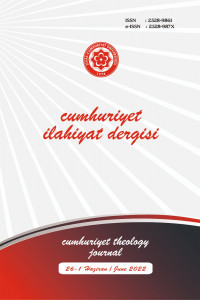Sadru’l-İslâm Döneminde Hulefâ-yi Râşidîn Tevkî‘leri: Analitik Bir Çalışma
The Signatures of the Rashideen Caliphs in the Early Islamic Era: An Analytical Study
Author(s): Mahmud KaddumSubject(s): Other Language Literature, Culture and social structure , Philology, Theory of Literature, Stylistics
Published by: Cumhuriyet Üniversitesi İlahyat Fakültesi
Keywords: Literature; Prose; the Age of Islam; Caliphs; The Signatures; Analytical;
Summary/Abstract: The Signatures are the writings written by the caliphs or their assistants in clear, short, and eloquent phrases or sometimes as a long phrase, depending on the subject or the culture of the author. These writings focus on the complaints of the society against oppressions or problematic situations around them. Signatures also imply writings written in short and eloquent expressions by the caliph or the waliyyul-amr (chief) in response to the lower section of the writings written on a matter regarding issues of the ordinary people of the educated/cultivated class, in which there is a complaint, a request or expressing an opinion. Because the waliyyul-amr (chief) does not have time to write long answers. There are many letters submitted to the caliphs, and all of them are waiting to be answered quickly. For this reason, Signatures have been both short and meaningful words. They have an essential place in the world of Arab politics and literature. This genre represented one of the forms of development in rhetoric in the Islamic centuries. It is possible to count Signatures as a criterion for the rhetoric of caliphs, emirs and governors since they are scripts specific to caliphs and it can thus be said that they are effective within the educated/cultivated class. This is a quality that increases the value of literature in the eyes of many critics. Because critics think that the best literary product is the kind of literary works understood by the ordinary people and accepted by the cultivated class. ‘Signature’ is an independent literary art and has its characteristics. The elements of conveying intention are ample in this genre. This type of writing is a hierarchical type of writing going from top to bottom. Signatures are distinguished from other literary genres with their strong structures, effective influence, and strong expression styles. Besides, they are effective for those who have effective oratory and have a strict seriousness. Upon looking at the case of the Signatures and the environment in which they were born, their emotional and political effects might be felt. The Signatures have been influential in the politics of all official affairs of the state and matters related to social issues. Sometimes, the Signatures appear as pamphlets or addresses which contain a few words of an oppressed person's complaints against a tyrant or oppressor. As soon as such a person reads it, he/she shudders with fear, especially if it has come from someone superior to him, a caliph, or a governor. For this reason, the Signatures, dealing with the complaints of oppressed people, is "written in a way healing in terms of meaning, revealing the persecution people have suffered, and declaring the success of their demands." This research regarding al-Khulafāʾ ar-Rāšidūn Rightly Guided Caliphs Hazrat Abu Bakr (d. 13/634), Hazrat Umar (d. 23/644), Hazrat ‘Uthman (d. 35/656) and Hazrat Ali (d. 40/661) examines the reference and textual contexts in the examples of the Signatures, as well as the general contexts of the Signatures in question, and aims at relating these Signature examples with their senders who have the qualities of authority, eloquence, and justice. The Signature texts, in full grace, without any additions or reductions to the text by the recipient need to be handled with awareness, forethought and responsibility. The research focuses on the production area of Signature and investigates the forms of expression in terms of the interpretations and istishats contained in these texts. In addition to these features, in the research, the texts of "Signature", which express a certain treatise, were used to state their expressions, and reveal the rhetorical aspects and textual differences they contain. As a result of the research, it seems clear that the Signature texts by the Rashid caliphs, by the contexts and production areas of the said texts have been written under a goal and with qualities such as wisdom, persuasion, laconic, suggestion, concentration, open-mindedness, and avoidance of closeness. It is also seen that the Signatures are useful sentences that revolve around a pattern of focusing and concentrating on the meaning, having filtered beautiful words, in a productive structure that combines the clarity of the wording and the literary aspect of the meaning based on the words of inspiration at the point of creating a lively language, and thus becoming a parable. Rashid Caliphs contributed to the spread of the art of the Signature. These Signature texts of the caliphs are compatible with the contexts and production areas of the said texts and based on wisdom, concentration, open-mindedness, and avoidance of closeness by a goal. In this way, they used these deductions in line with a certain goal to solve many political and social issues.
Journal: Cumhuriyet İlahiyat Dergisi
- Issue Year: 26/2022
- Issue No: 1
- Page Range: 65-81
- Page Count: 17
- Language: Turkish

